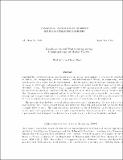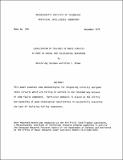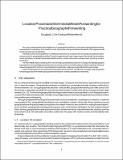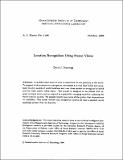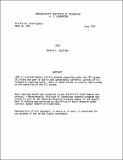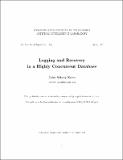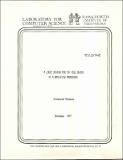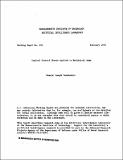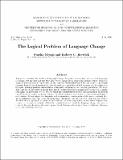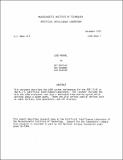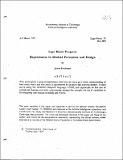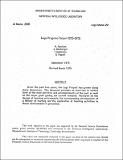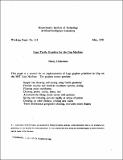Browsing Computer Science and Artificial Intelligence Lab (CSAIL) by Title
Now showing items 1896-1915 of 3804
-
Local Versus Global Control Laws for Cooperative Agent Teams
(1992-03-01)The design of the control laws governing the behavior of individual agents is crucial for the successful development of cooperative agent teams. These control laws may utilize a combination of local and/or global ... -
Localization and Positioning Using Combinations of Model Views
(1992-09-01)A method for localization and positioning in an indoor environment is presented. The method is based on representing the scene as a set of 2D views and predicting the appearances of novel views by linear combinations ... -
Localization of Failures in Radio Circuits: A Study in Causal and Teleological Reasoning
(1974-12-01)This paper examines some methodologies for diagnosing correctly designed radio circuits which are failing to perform in the intended way because of some faulty component. Particular emphasis is placed on the utility ... -
Location Recognition Using Stereo Vision
(1989-10-01)A mobile robot must be able to determine its own position in the world. To support truly autonomous navigation, we present a system that builds and maintains its own models of world locations and uses these models to ... -
Lock
(1972-06-01)LOCK is a miscellaneous utility program operating under the ITS system. It allows the user to easily and conveniently perform a variety of infrequently required tasks. Most of these relate to console input-output or the ... -
Logging and Recovery in a Highly Concurrent Database
(1994-06-01)This report addresses the problem of fault tolerance to system failures for database systems that are to run on highly concurrent computers. It assumes that, in general, an application may have a wide distribution in ... -
A Logic Design for the Cell Block of a Data-flow Processor
(1977-12)Recently studies on parallel computation architecture have yielded a new type of computer architecture known as the data-flow processor. As part of the effort in realizing the data-flow processor, a logic design for the ... -
The Logic of Systems
(1976-12)We present a theory about the logical relationships associated with system behavior. The rules governing the behavior of a system are expressed by a Petri net. A set of assumptions about the modeling of a system permit ... -
Logic Simulation of a Multiprocessor
(1986-10)The performance of circuit simulators running on SISD computers is fundamentally limited by the Von Neumann bottleneck. Multiprocessors do not share this limitation. The task of solving the equations for the many parallel ... -
Logical Control Theory Applied to Mechanical Arms
(MIT Artificial Intelligence Laboratory, 1979-02)A new control algorithm based upon Logical Control Theory is developed for mechanical manipulators. The controller uses discrete tesselations of state space and a finite set of fixed torques to regulate non-rehearsed ... -
Logical Disk: A Simple New Approach to Improving File System Performance
(1993-04)Making a file system efficient usually requires extensive modifications. For example, making a file system log-structured requires the introduction of new data structures that are tightly coupled with the general file ... -
The Logical Problem of Language Change
(1995-12-01)This paper considers the problem of language change. Linguists must explain not only how languages are learned but also how and why they have evolved along certain trajectories and not others. While the language ... -
Logical Structure for Functional Languages
(1986-02)Functional Programming is frequently advocated as an appropriate programming discipline for parallel processing because of the difficulty of extracting parallelism from programs written in conventional sequential programming ... -
Logics of Programs: Axiomatics and Descriptive Power
(1978-05)This thesis is concerned with the development of mathematical tools for reasoning about computer programs. The approach is to design and investigate the properties of various dynamic logics with an emphasis on useful ... -
LOGO Manual
(1974-12-01)This document descibes the LOGO system implemented for the PDP 11/45 at the M.I.T. Artificial Intelligence Laboratory. The "system" includes not only the LOGO evaluator, but also a dedicated time-sharing system which ... -
Logo Music Projects: Experiments in Musical Perception and Design
(1979-05-01)This memo gives a series of experiments which one can use to get a better understanding of how music works and how music is apprehended by an active and knowing listener. It does so by using the children's computer ... -
Logo Progress Report 1973-1975
(1975-09-01)Over the past two years, the Logo Project has grown along many dimensions. This document provides an overview in outline form of the main activities and accomplishments of the past as well as the major goals guiding ... -
Logo Turtle Graphics for the Lisp Machine
(MIT Artificial Intelligence Laboratory, 1981-05-05)This paper is a manual for an implementation of Logo graphics primitives in Lisp on the MIT Lisp Machine. The graphics system provides: Simple line drawing and erasing using "turtle geometry" Flexible relative and absolute ... -
Long Atomic Computations
(1986-10)Distributed computing systems are becoming commonplace and offer interesting opportunities for new applications. In a practical system, the problems of synchronizing concurrent computations and recovering from failures ...


